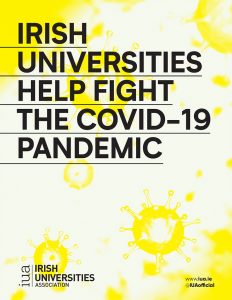As coronavirus continues to dramatically reshape how higher education systems operate, smaller destinations such as Ireland are commanding attention for their approach to supporting international students at a time when others have been accused of allowing them to “fall through the cracks”.
News and business analysis for Professionals in International Education
Have some pie!
Aiming for excellence in a time of crisis for international education: Ireland
 When it comes to guidance around Covid-19 being provided by third-level institutions, 70% of international students said they were 'satisfied' or very 'satisfied'. Photo: Adam Markon/ Unsplash
When it comes to guidance around Covid-19 being provided by third-level institutions, 70% of international students said they were 'satisfied' or very 'satisfied'. Photo: Adam Markon/ Unsplash A recent analysis commissioned by the Australian federal government and published by The Age and Sydney Morning Herald listed Ireland among countries that have “provided much more support to international students during the coronavirus pandemic than Australia”.
“We are very mindful that our international students do not have a local family support network”
The reasons range from the inclusion of international students in social payments, tenant protection measures and permission for students on certain visas to work for up to 40 hours a week. But that’s just the beginning.
Support
In a bid to contain the spread of Covid-19, all schools in Ireland were ordered to close by the country’s taoiseach (prime minister) Leo Varadkar as of March 13, and are expected to re-open on a phased basis at the beginning of the academic year 2020/21.
The country is expecting to feel a significant financial pinch as a result of the pandemic. Ireland’s seven universities can expect an 80% falloff in first-year registration of overseas students this autumn according to the Irish Universities Association, and institutions are becoming increasingly vocal in their pleas for government support amid such predictions.
A €20m international student recruitment fund is being sought to drive the recovery of the international student business with €10m to go to an Education in Ireland promotion campaign and €10m to institutions for their individual recruitment campaigns.
But while education groups in Australia, Canada and the UK have had to fight for funding alongside greater support for international students – each with varying degrees of success – Ireland has introduced some strong measures to ensure international students can weather the storm alongside their domestic counterparts.
For example, students who have lost their job as a result of Covid-19, and who have a Personal Public Service number, are eligible to apply for the Covid-19 Pandemic Unemployment Payment of €350 per week for the duration of the crisis.
“If you are an international student who has lost their job and you do not have a PPS number, you can still apply for an Exceptional Needs Payment,” explains Education In Ireland on its website.
In addition, “all international students whose Irish Residency Permit is due to expire between March 20 and May 20 will have their visa permission automatically renewed for this period”.
Other benefits highlighted by the Irish Council for International Students range from healthcare – all international students will have free access to the Irish healthcare system for treatment related to Covid-19 – and accommodation: “you cannot be evicted during the coronavirus pandemic”.
Most recently, ICOS has noted that international students who have recently arrived in Ireland and have not yet registered with immigration, will not need to prove that they still have access to the financial requirement for a student visa when immigration registration recommences.
According to ICOS executive director, Sarah Lennon, this has thrown a lifeline of sorts to students that may have struggled otherwise.
“Many international students would have arrived reasonably expecting to have casual work available, as they have a right to access,” she tells The PIE.
“The cost of accommodation, in particular, can be very high especially in our major cities, and depending on the length of the crisis, casual work may be difficult to pick up for a long time.
“Additionally, the ban on evictions is positive as this provides a level of security for students who may have lost their casual work during the crisis,” she notes, adding that ICOS is concerned about the capacity of international students to pay back-rent after the pandemic ends.
Lennon also points out that many of the students ICOS has spoken with are feeling positive about the response by the Irish government, particularly in ensuring that international students can access the pandemic payment.
However, a number students have reported difficulties in accessing the payments, with 21% of third-level international students who took part in a recent ICOS survey reporting having lost their job and being unable to access the state support.
Lennon says that recently-arrived students are in a particularly vulnerable situation with many having difficulty accessing a PPS number, without which they are not eligible to access the pandemic payment or jobseekers payments.
“It is really tricky for international students,” noted one Malaysian student respondent.
“We are unsure about returning home due to the risk…at the same time, we know that staying here for long would not be a rational choice, as careers prospects pose a lot of uncertainties.
“We are unsure about returning home due to the risk… we know that staying here for long would not be a rational choice”
“This is especially tough for those who are not eligible for any social welfare payment like myself. I was planning to look for a job during the summer but the chances are low now,” they said.
Lennon notes, “One of the most concerning results of the survey is that there are students who have lost their jobs and newly-arrived students who cannot take up employment due to the current crisis. Many of these students are not in receipt of any income.
“These students would have come to Ireland with a realistic expectation of getting work relatively easily, but due to Covid-19, this has not been possible, and many are facing financial hardship.”
Other issues raised by the survey respondents included dissatisfaction with online classes, language barriers and concerns about a lack of social distancing due to having to share a room with several other people.
However, when it comes to the guidance around Covid-19 provided by third-level institutions, 70% of international students said they were ‘satisfied’ or very ‘satisfied’, with 61% of students ‘satisfied’ or ‘very satisfied’ overall about the support they had received from their institution.
“Many of the third-level institutions are organising virtual social events such as coffee mornings or Netflix evenings, which is providing some social outlets for students who may otherwise be quite isolated,” adds Lennon.
Wellbeing

The IUA has outlined some of the key highlights of the efforts of Irish universities to tackle the Covid-19 crisis
Faced with predicted losses of around €181m in international student fees and unprecedented societal challenges, the Irish universities sector has galvanised into action in areas including research and innovation, specialist training and of course, student wellbeing and support, as outlined in a new document published by the IUA.
One university that has been well recognised for its supportive international student environment is the University of Limerick, which recently received an award for Best Erasmus Programme at the Irish Education Awards for the third consecutive year, and placed second out of 199 institutions for international student happiness, according to the i-graduate International Student Barometer in 2019.
Now in a time of crisis, UL’s director of the International Division, Josephine Page, tells The PIE that support has been ramped up even further.
She explains that a Student Support officer is available to advise international students on the government’s response to Covid-19, including the social payments available to students who have lost part-time jobs, free health care for all Covid-19 related illness and the automatic visa extension for all international students.
“We are very mindful that our international students do not have a local family support network and have therefore developed additional student supports to ensure a seamless move to on-line learning and assessment,” says Page.
“A range of virtual social activities, as well as regular check-in phone calls, ensure that students are engaged and aware of all the supports in place, and international students have access to extended online counselling and medical centre services, as well as a hardship fund.
“We are very mindful that our international students do not have a local family support network”
“For students who need to self-isolate there is a meal/shopping/medicine delivery service and extended summer accommodation on campus has been made available for those who cannot return home,” Page adds.
With universities across Ireland coming together to make a valuable contribution to the national efforts to fight the Covid-19 pandemic, Lennon at ICOS adds that she hopes that endeavours to provide vital support to international students continue beyond the current crisis.
“From ICOS’ perspective, we have been impressed at how many stakeholders such as our government departments concerned with Justice, Education, Social Welfare and Foreign Affairs have worked collaboratively to identify and address concerns as they arise.
“However, it is essential this collaboration continues into the future and after the crisis has lifted,” she adds.
Still looking? Find by category:


